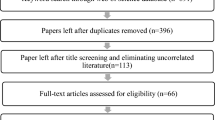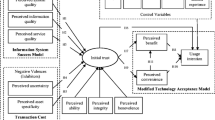Abstract
Whether or how firms can employ the halo effect to facilitate their mobile payment service adoption remains a critical and puzzling issue in e-commerce research. Using the schema theory and the value literature as theoretical lenses, this study investigates the role of halo effect on mobile payment value perceptions and usage intentions. More specifically, we identify two types of mobile payment value: utilitarian and hedonic value. A field survey with 273 responses is conducted to test the research model and hypotheses. Our findings show that the two factors of the web-mobile payment relationship, namely perceived similarity and perceived business tie, can lead to increased value perceptions of mobile payment. Moreover, both utilitarian value and hedonic value are positively associated with mobile payment usage intention. We expect this study can provide valuable insights regarding the significant role of halo effect when consumers make the decision to use mobile payment services. Limitations, theoretical and practical implications are also discussed.
Access this chapter
Tax calculation will be finalised at checkout
Purchases are for personal use only
Preview
Unable to display preview. Download preview PDF.
Similar content being viewed by others
References
Wang, N., Shen, X.-L., Sun, Y.: Transition of electronic word-of-mouth services from web to mobile context: A trust transfer perspective. Decis. Support Syst. 54(3), 1394–1403 (2013)
Zhou, T.: An empirical examination of continuance intention of mobile payment services. Decis. Support Syst. 54(2), 1085–1091 (2013)
Lu, Y., Yang, S., Chau, P.Y.K., Cao, Y.: Dynamics between the trust transfer process and intention to use mobile payment services: A cross-environment perspective. Inf. Manage. 48(8), 393–403 (2011)
Dou, W., Lim, K.H., Su, C., Zhou, N., Cui, N.: Brand positioning strategy using search engine marketing. MIS Q. 34(2), 261–279 (2010)
Kim, S.S.: The integrative framework of technology use: an extension and test. MIS Q. 33(3), 513–537 (2009)
Sun, Y., Shen, X.-L., Wang, N.: Understanding the role of consistency during web–mobile service transition: Dimensions and boundary conditions. Int. J. Inf. Manag. 34(4), 465–473 (2014)
Stewart, K.J.: Trust transfer on the world wide web. Organ. Sci. 14(1), 5–17 (2003)
Stewart, K.J.: How hypertext links influence consumer perceptions to build and degrade trust online. J. Manag. Inf. Syst. 23(1), 183–210 (2006)
Chandra, S., Srivastava, S.C., Theng, Y.-L.: Evaluating the role of trust in consumer adoption of mobile payment systems: An empirical analysis. Commun. Assoc. Inf. Syst. 27(29), 561–588 (2010)
Liébana-Cabanillas, F., Sánchez-Fernández, J., Muñoz-Leiva, F.: The moderating effect of experience in the adoption of mobile payment tools in Virtual Social Networks: The m-Payment Acceptance Model in Virtual Social Networks (MPAM-VSN). Int. J. Inf. Manag. 34(2), 151–166 (2014)
Yang, S., Lu, Y., Gupta, S., Cao, Y., Zhang, R.: Mobile payment services adoption across time: An empirical study of the effects of behavioral beliefs, social influences, and personal traits. Comput. Hum. Behav. 28(1), 129–142 (2012)
Xu, J.D., Benbasat, I., Cenfetelli, R.T.: Integrating service quality with system and information quality: An empirical test in the e-service context. MIS Q. 37(3), 777–794 (2013)
Brown, S.A., Venkatesh, V.: Model of adoption of technology in households: A baseline model test and extension incorporating household life cycle. MIS Q., pp. 399–426 (2005)
Venkatesh, V., Thong, J.Y., Xu, X.: Consumer acceptance and use of information technology: extending the unified theory of acceptance and use of technology. MIS Q. 36(1), 157–178 (2012)
Kim, Y.H., Kim, D.J., Wachter, K.: A study of mobile user engagement (MoEN): Engagement motivations, perceived value, satisfaction, and continued engagement intention. Decis. Support Syst. 56, 361–370 (2013)
Kim, H.-W., Chan, H.C., Gupta, S.: Value-based Adoption of Mobile Internet: An empirical investigation. Decis. Support Syst. 43(1), 111–126 (2007)
Wakefield, R.L., Whitten, D.: Mobile computing: a user study on hedonic/utilitarian mobile device usage. European Journal of Information Systems. Eur. J. Inf. Syst. 15(3), 292–300 (2006)
Brewer, W.F., Nakamura, G.V.: The Nature and Functions of Schemas. Handb. Soc. Cogn., pp. 119–160 (1984)
Louis, M.R., Sutton, R.I.: Switching cognitive gears: From habits of mind to active thinking. Human relations. Hum. Relat. 44(1), 55–76 (1991)
Armstrong, D.J., Hardgrave, B.C.: Understanding mindshift learning: the transition to object-oriented development. MIS Q., pp. 453–474 (2007)
Nadkarni, S., Narayanan, V.K.: Strategic schemas, strategic flexibility, and firm performance: the moderating role of industry clockspeed. Strateg. Manag. J. 28(3), 243–270 (2007)
Lin, J., Lu, Y., Wang, B., Wei, K.K.: The role of inter-channel trust transfer in establishing mobile commerce trust. Electron. Commer. Res. Appl. 10(6), 615–625 (2011)
Daniel, D.: Four Tips for Better Business Intelligence in 2008 (2008)
Parboteeah, D.V., Valacich, J.S., Wells, J.D.: The Influence of Website Characteristics on a Consumer’s Urge to Buy Impulsively. Inf. Syst. Res. 20(1), 60–78 (2009)
Ren, Y., Harper, F.M., Drenner, S., Terveen, L.G., Kiesler, S.B., Riedl, J., Kraut, R.E.: Building Member Attachment in Online Communities: Applying Theories of Group Identity and Interpersonal Bonds. MIS Q. 36(3), 841–864 (2012)
Song, P., Zhang, C., Xu, Y., Huang, L.: Brand extension of online technology products: Evidence from search engine to virtual communities and online news. Decis. Support Syst. 49(1), 91–99 (2010)
Li, Y.: The impact of disposition to privacy, website reputation and website familiarity on information privacy concerns. Decis. Support Syst. 57, 343–354 (2014)
Hsieh, M.-H., Pan, S.-L., Setiono, R.: Product-, Corporate-, and Country-Image Dimensions and Purchase Behavior: A Multicountry Analysis. J. Acad. Mark. Sci. 32(3), 251–270 (2004)
Polites, G.L., Karahanna, E.: Shackled to the Status Quo: The Inhibiting Effects of Incumbent System Habit, Switching Costs, and Inertia on New System Acceptance. MIS Q. 36(1), 21–42 (2012)
Sigall, H., Ostrove, N.: Beautiful but dangerous: Effects of offender attractiveness and nature of the crime on juridic judgment. J. Pers. Soc. Psychol. 31(3), 410 (1975)
Montoya, M.M., Massey, A.P., Khatri, V.: Connecting IT Services Operations to Services Marketing Practices. J. Manag. Inf. Syst. 26(4), 65–85 (2010)
Kim, D.J., Hwang, Y.: A study of mobile internet user’s service quality perceptions from a user’s utilitarian and hedonic value tendency perspectives. Inf. Syst. Front. 14(2), 409–421 (2012)
Deng, Z., Lu, Y., Wei, K.K., Zhang, J.: Understanding customer satisfaction and loyalty: An empirical study of mobile instant messages in China. Int. J. Inf. Manag. 30(4), 289–300 (2010)
Jia, H.M., Wang, Y., Ge, L., Shi, G., Yao, S.: Asymmetric Effects of Regulatory Focus on Expected Desirability and Feasibility of Embracing Self-Service Technologies: JIA, WANG, GE, SHI, AND YAO. Psychol. Mark. 29(4), 209–225 (2012)
Liang, H., Xue, Y.: Avoidance of information technology threats: a theoretical perspective. MIS Q. 33(1), 71–90 (2009)
Sia, C.L., Lim, K.H., Leung, K., Lee, M.K., Huang, W.W., Benbasat, I.: Web strategies to promote internet shopping: is cultural-customization needed? MIS Q. 33(3), 491–512 (2009)
Chin, W.W., Marcolin, B.L., Newsted, P.R.: A partial least squares latent variable modeling approach for measuring interaction effects: Results from a Monte Carlo simulation study and an electronic-mail emotion/adoption study. Inf. Syst. Res. 14(2), 189–217 (2003)
Hair, J.F., Tatham, R.L., Anderson, R.E., Black, W.: Multivariate data analysis, vol. 6. Pearson Prentice Hall Upper Saddle River, NJ (2006)
Sigall, H., Ostrove, N.: Beautiful but dangerous: Effects of offender attractiveness and nature of the crime on juridic judgment. J. Pers. Soc. Psychol. 31(3), 410 (1975)
Author information
Authors and Affiliations
Corresponding author
Editor information
Editors and Affiliations
Rights and permissions
Copyright information
© 2015 Springer International Publishing Switzerland
About this paper
Cite this paper
Gong, X., Zhang, K.Z.K., Zhao, S.J. (2015). Halo Effect on the Adoption of Mobile Payment: A Schema Theory Perspective. In: Benyoucef, M., Weiss, M., Mili, H. (eds) E-Technologies. MCETECH 2015. Lecture Notes in Business Information Processing, vol 209. Springer, Cham. https://doi.org/10.1007/978-3-319-17957-5_10
Download citation
DOI: https://doi.org/10.1007/978-3-319-17957-5_10
Published:
Publisher Name: Springer, Cham
Print ISBN: 978-3-319-17956-8
Online ISBN: 978-3-319-17957-5
eBook Packages: Computer ScienceComputer Science (R0)




